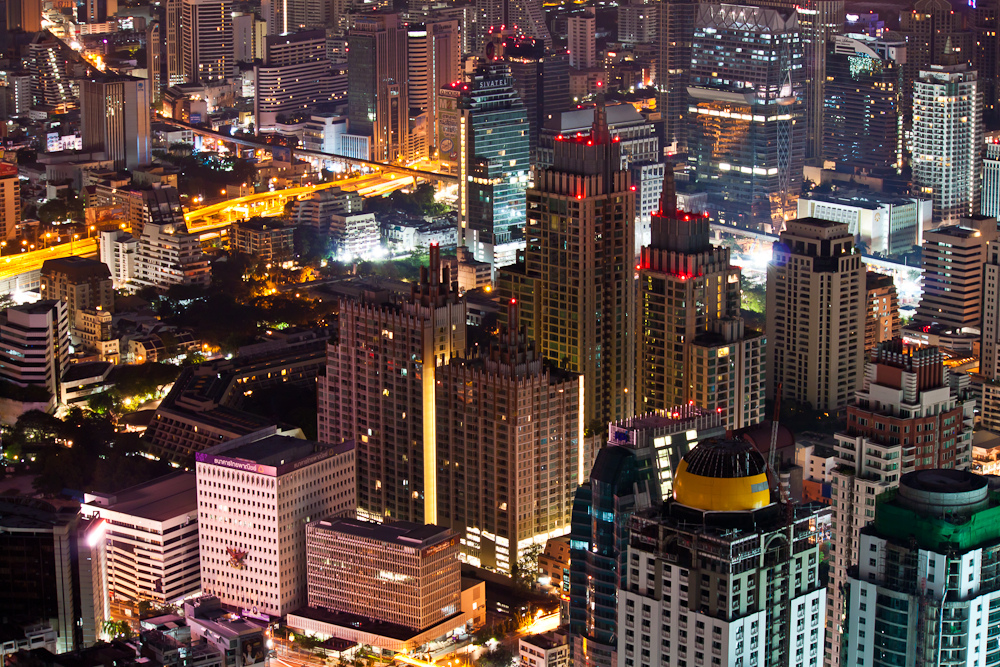
Living in Bangkok is different than being a tourist. With 30 baht beers and 50 baht meals, the country is very cheap for visitors with plenty of spending money. However if you’re based in Thailand and have a modest salary, money can be spent rather quickly and catch you unawares.
The cost of living widely depends on a number of factors. I’ve been living here with my boyfriend for nearly three months now and am just now starting to get a grasp of how much we spend.
A good rule of thumb is: the more you aim towards living like the locals, the cheaper it will be. I live somewhere near the middle.
Rent is your biggest single monthly expense, which makes it one of the most determining factors. There are countless condos to choose from in all areas of town. These vary from a studio apartment sans kitchen and air-conditioning for 8,000 baht to glitzy new serviced condos for 35,000+ baht a month. Many places come furnished, which spares you the cost of furniture shopping. Location-wise you can survive anywhere, but most expats prefer to be in walking distance to a MRT or BTS mass-transit station. If you aren’t, you will need to use a taxi (or own a motorbike), which can result in hours of wallowing in Bangkok’s notorious traffic. The area where many expats like to live on is Sukhumvit, the main road and entertainment hub of the city. Asok, Phrom Phong, and Thong Lor districts lining Sukhumvit are the hippest—and consequently result in premium prices. The Silom and Sathorn area, considered the business district, is another popular living locale. Another factor to consider is how safe the area is. Is there 24-hour security? Do you feel comfortable walking home at night? More miscellaneous factors that will impact costs are amenities (pool, gym, etc.) and the furniture—Is it dated, new, to your taste?
In comparison, I live in a non-serviced, full-furnished large studio for 18,000 baht a month. It is in Ekkamai, one stop away from Thong Lor on the BTS. The condo is fairly new with high security and the standard amenities. It comes with modern furniture, granite countertops, and floor-to-ceiling glass doors that separate the kitchen, bedroom, and living room.
Utilities naturally come next. Water is cheap and normally is no more than 200 baht a month. How much air conditioning you use makes the difference between 1000 baht to 3000 baht a month for electricity. Then there’s Internet and cable. For English-language channels, expect to pay about 1500 baht a month for cable. High-speed wireless Internet can be had for about 600 baht, router included on a year contract. The cost of cell phone service depends wildly.
We don’t watch television, so we save lots of money. We are also very conservative with the water and electricity, costing me 90 baht and 1000 baht a month, respectively. Internet is 600 baht a month. We use a cheap pre-paid phones, costing us 300 a month for texting and calls.
Transport costs have a way of sneaking up on you. Using the BTS or MRT can cost around 1000-2000 baht a month, especially if commuting daily to an office. Add another 1000 baht for taxis if you are out on the town regularly.
I don’t commute, but my significant other does. He spends 2000 baht a month on the BTS for 100 pre-paid trips at 20 baht each (there’s a discount for buying a pre-paid trip pass). We rarely use taxis, but they run us about 100 baht a trip.
Food is where eating like a Thai versus a Westerner truly makes a difference. You can get Thai food from stalls anywhere between 20-50 baht. Fresh fruit is readily available on the streets. Most Western food in general is expensive, usually in the range of 200-400 baht for a standard Indian curry, Mexican burrito, or Australian beef burger. Costs are also high for the upscale supermarkets, such as Gourmet Market or Big C. Surprisingly, many people find it more expensive to cook at home than to eat out. Unsurprisingly, most expats get sick of Thai food eventually, which will raise food costs over time.
We eat somewhere in the middle. We eat a good amount of Thai food, supplemented with home cooking (about 150 baht for 2 people) and Western splurges. Our guilty pleasure is a weekly large stuffed crust pizza for 580 baht a pop. We approximately spend 12000 baht a month on food.
Alcohol costs are determined by drinking out versus drinking in. A small Thai domestic such as Chang or Singha is around 30 baht at 7-11 or a supermarket. At a bar, the same will be 70, or up to 100 a glass in a swank establishment. Imported European beers or ciders can run up to 200-250 a pint. Wine is very expensive as well, with the cheapest drinkable bottle running at about 400 baht and a glass at a restaurant running from 100-200 baht on average.
We are pretty conservative on drinking, we’ll grab a few large San Miguels a week for 57 baht each at the supermarket. Every few weeks, we’ll buy a bottle of swine or grab a drink out. Maybe we’ll spend 2000 baht per month on alcohol.
Our total per month (two people)
18000 rent
1990 bills
3000 transportation
12000 food
2000 alcohol
Total: 36,990 baht a month
Of course, this covers just the basics. Account for extra money for contingencies, such as visa runs. Not to mention unaccounted for expenses such as household goods, clothes, and entertainment. There are countless variables, but I hope this helps you get an idea of the average costs of living in Bangkok.